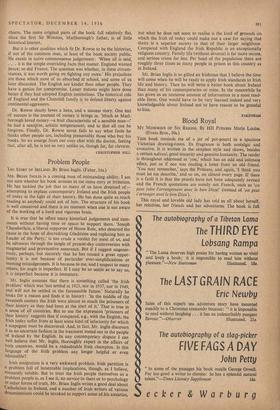Problem People
THE STORY OF IRELAND. By Brian Inglis. (Faber, 16s.) MR. BRIAN INGLIS is a coming man of outstanding ability. I am not sure whether his book arouses in me more envy or irritation. He has tackled the job that so many of us have dreamed of— attempting to explain contemporary Ireland and the Irish people of today in the light of their history. He has done quite as much reading as anybody could ask of him. The structure of his book is well conceived and there is no moment when one is not aware of the working of a hard and vigorous brain.
It is true that he offers many historical judgements and com- ments without having time or space to support them. 'Joseph Chamberlain, a liberal supporter of Home Rule, who deserted the cause in the hope of discrediting Gladstone and replacing him as Leader of the Party,' is too crude a verdict for most of us, and he advances through the tangle of present-day controversies with magisterial and provocative assurance., But if I suggest ungener- ously, perhaps, but sincerely that he has missed a great oppor- tunity it is not because of particular over-simplifications or seeming misjudgements. It is because to me, and I suspect to many others, his angle is imperfect. If I may be so senile as to say so, it is imperfect because it is immature.
Mr. Inglis assumes that there is something called 'the Irish problem' which was 'not settled in 1921, nor in 1937, nor in 1949, and will not be settled in the foreseeable future.' Naturally he looks for a reason and finds it in history : 'In the middle of the twentieth century the Irish were almost as much the prisoners of their history as they had been at the start of it.' That is true in a sense of all countries. But to use the expression 'prisoners of their history' suggests that if compared, e.g., with the English, the Irish today suffer from at least some kind of inferiority for which a scapegoat must be discovered. And, in fact, Mr. Inglis discovers it in no uncertain fashion in the treatment meted out to the people of Ireland by the English. In any contemporary dispute I can well believe that Mr. Inglis, thoroughly expert in the affairs of both countries, would be a redoubtable Irish champion. Is this language of the Irish problem any longer helpful or even admissible?
Irish emigration is a very awkward problem. Irish partition is a problem full of lamentable implications, though, as I believe, eminently soluble. But to treat the Irish people themselves as a problem people is, as I see it, no service to them or to psychology or other forms of truth. Mr. Brian Inglis writes a good deal about Catholicism in Ireland, and a number of Irish writers of various denominations could be invoked to support some of his anxieties, but what he does not seem to realise is the kind of grounds on which the Irish of today could make out a case for saying that theirs is a superior society to that of their larger neighbour. Compared with England the Irish Republic is an exceptionally religious country. Family life (without divorce) is far more secure, and serious crime far less. Per head of the population there are roughly three times as many people in prison in this country as in Ireland.
Mr. Brian Inglis is so gifted an Irishman that I believe the time will come when he will be ready to apply Irish standards to Irish life and history. Then he will write a better book about Ireland than many of his contemporaries or mine. In the meanwhile he has given us an immense amount of information in a most read- able form. One would have to be very learned indeed and very knowledgeable about Ireland not to have reason to be grateful to him.
PAKENHAM










































 Previous page
Previous page